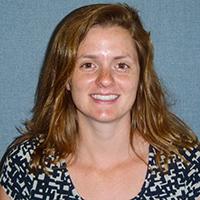Tim Lucas
(919) 613-8084
tdlucas@duke.edu
By Parker Brown
An entrepreneur, a lawyer, an MBA graduate, an environmental analyst and a Master of Science graduate walk into a bar. This might sound like a setup for a bad joke, but it’s actually more likely to be a list of attendees at a Nicholas School undergraduate alumni social.
This is because new and blended career opportunities are now the norm for those who graduate from Duke with a degree in earth and ocean sciences or environmental sciences, according to Charlotte Clark, director of undergraduate programs and assistant professor of the practice in sustainability education.
The Nicholas School cooperates with Trinity College of Arts & Sciences in awarding four undergraduate degrees: BA in environmental sciences and policy, BS in environmental sciences, and a BA and BS in earth and ocean sciences.
Not only do the majors offer a rigorous curriculum, they prepare students for many career paths and can add value to any other major, says Clark.
That has been the case for five undergraduate alumni who have each pursued their passions and charted a unique career journey.
COURTNEY BELL T’17, BS IN ENVIRONMENTAL SCIENCES
Courtney Bell already had a passion for sustainable food when she took Chantal Reid’s freshman seminar on food systems, but the seminar was the start of a relationship that would lead to Bell getting her degree in environmental sciences with Reid as her advisor.
Knowing about Bell’s sustainable food passion, a classmate convinced her to venture into entrepreneurship. Together they founded Ungraded Produce, a startup delivery service for “ugly” fruits and vegetables, with help from a $5,000 grant from the Nicholas School’s Innovation and Entrepreneurship Program.
“The Nic School community, particularly my advisor, were very supportive of what we were doing. That more than anything was really special,” Bell says.
They started their venture at Duke in fall 2016 with 15 subscribers who received 10-pound bags of ugly produce from the trunk of Bell’s car. Ungraded now serves more than 500 subscribers in the Triangle, with plans to spread out across the state, and perhaps beyond, one day.
JAMES FERGUSON T’15, BS IN ENVIRONMENTAL SCIENCES
James Ferguson likes to say that his job is to save the environment while saving the environment. Ferguson, a senior environmental analyst at Cypress Creek Renewables, manages the environmental studies and permitting for utility-scale solar projects in several different states. The goal of his work is to minimize and manage project impacts to the land and water.
Much like Bell, Ferguson came to Duke with a keen interest in environmental sciences. He was persuaded to major in it after taking an introductory course because he was impressed with the quality of the faculty and the interdisciplinary nature of the field.
“Majoring in environmental sciences at the Nicholas School has given me a strong foundation in natural sciences. This has allowed me to understand and communicate the nature of technical reports effectively. The school also taught me how to think critically about and discuss multiple dimensions of an environmental issue, whether it be policy solutions to the ivory trade or how to engage a community around solar development,” says Ferguson.
SARAH EAGLE T’08, BS IN EARTH AND OCEAN SCIENCES
A degree in environmental sciences or earth and ocean sciences provides skills to enter the workforce immediately, as Bell and Ferguson did, but many students decide to continue their education.
In fact, roughly half of all undergraduates associated with the Nicholas School go on to pursue an advanced degree, according to Chantal Reid, assistant professor of the practice of biology and director of undergraduate studies for environmental sciences.
While many earn a Master of Science, Master of Environmental Management or PhD in environmental fields, a Nicholas education is also a pathway to many other advanced degree programs, she says.
Sarah Eagle was a lab technician as well as a major in the Earth and Ocean Sciences division. She learned a lot of technical skills in the lab that helped expand her knowledge beyond her coursework. Eagle also knew she wanted to continue to develop more specialized and technical knowledge that only a Master of Science could provide.
So she earned a Master of Science in geosciences and hydro geosciences from Virginia Tech. She is now a program manager at the Texas Commission on Environmental Quality where she leads a team of people responsible for overseeing the implementation of the Texas Clean Rivers Program. Eagle draws from all her educational experience in that role.
“It seemed to me when I was in school that I needed to choose either a science or a policy path, but I’ve found in my career that the two dove tail significantly,” says Eagle. “I find that a robust liberal arts education (which Duke provides) combined with my science degrees from Duke and Virginia Tech have prepared me well to engage in policy discussions and also to understand and to contribute to the science behind them.”
DOUG HASTINGS T’09, BA ENVIRONMENTAL SCIENCES AND POLICY, AND JAMIE PATRICK T’13, BS ENVIRONMENTAL SCIENCES
Doug Hastings and Jamie Patrick decided to augment their Duke education outside the sciences with a Juris Doctor and Master of Business Administration, respectively.
“I think having an environmental sciences background made me stand out as a candidate to business school and also makes me stand out in the job market,” says Patrick. “Out of the 400+ in my business school class, there was only a handful of people with an environmental sciences or earth and ocean sciences background.”
Patrick grew up working on farms and was inspired by his grandfather, who was a farmer. But he also was interested in developing economies and promoting sustainability, so he added a Stanford MBA to his Nicholas education.
Now, a senior associate at McKinsey & Company in Minnesota, he does consulting related to agriculture and sustainability. His work includes a recent project that helped a major multilateral organization create a strategy for investing in women farmers in Africa.
“The most important thing that I gained as a Duke undergrad was a broad understanding of how the environment works. I was able to get the chance to learn about everything from climatology to toxicology to sedimentology, and I loved learning about all of it,” says Patrick.
JAMIE PATRICK T’13
Hastings came to Duke with a strong interest in environmental sciences, but he discovered through his coursework that he was particularly interested in legal and policy issues.
“One class I particularly enjoyed was on ocean and water policy issues with Professor Steve Roady, which was cross-listed with the law school,” says Hastings. “While I had never seen a law textbook before and was at first somewhat confused and intimidated, I soon found that the intersection of law and environmental policy is incredibly interesting.”
He went on to earn a JD at Harvard, and is now an associate at Morgan, Lewis & Bockius LLP in Washington, D.C. There he represents clients in environmental litigation and counsels them on compliance with environmental laws. Hastings says he relies on his science background, as environmental legal matters often demand an understanding of the science behind the legislation.
Parker Brown is the Nicholas School’s Recruitment Writing Intern.






